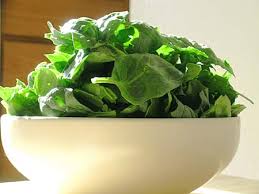From:http://www.thehealthyhomeeconomist.com/think-raw-veggies-are-best-think-again/
Think Raw Veggies are Best? Think Again
827
542
share1395
Not everything should be eaten raw, especially vegetables!
Some vegetables must be cooked else you are actually harming yourself. Below is a rundown of what veggies should not be eaten raw either in whole or juiced form.
Cruciferous Vegetables
Sorry to be the bearer of bad news, but cruciferous vegetables should be cooked
before eating as they contain chemicals that BLOCK the production of
thyroid hormone in your body! Considering that 2 out of every 3
Westerners are either overweight or obese and this is projected to jump to 75% by 2020, this is of particular importance as folks struggling with weight usually suffer from borderline to full blown hypothyroidism.
Hypothyroidism is a condition where the thyroid gland does not make
enough thyroid hormone, so someone suffering from this condition surely
does not want to be eating foods that will block what little thyroid
hormone is being produced in the first place!Symptoms of hypothyroidism include cold hands and feet, thinning hair, fatigue, reduced or nonexistent libido, coarse dry hair, constipation, difficulty losing weight, and depression among many others.
Cooking crucifers reduces the goitrogenic substances by about 2/3. Fermentation does not reduce goitrogens in these veggies, but since fermented crucifers such as sauerkraut are typically eaten as a condiment and, hence, in small amounts, consumption is fine if the diet is rich in iodine.
Here is the list of common cruciferous vegetables that you do not want to be eating raw if you want to protect your thyroid gland!
Arugula, broccoli, kale, cauliflower, cabbage, turnip, collard greens, bok choy, brussels sprouts, radish, rutabaga, and watercress.
Notice that many of these vegetables are commonly included in fresh veggie juice blends or in salads. While an occasional arugula salad or cup of coleslaw is not going to do harm to most folks, it would be wise not to make a habit of eating/drinking any of these vegetables in raw form.
Veggie Greens
Some veggie greens contain a chemical called oxalic acid. Oxalic acid is a very irritating substance to the mouth and intestinal tract. It also blocks iron and calcium absorption and may contribute to the formation of kidney stones.
The good news is that oxalic acid is reduced by a light steaming or cooking – just be sure to discard the cooking water.
Veggies containing oxalic acid include spinach, chard, parsley, chives, purslane and beet greens.
Hmmmm. Spinach is known for being high in iron, yet eating it raw will not necessarily give you the iron you want because of the oxalic acid?
Yep, that’s right. Cook that spinach first if you are seeking an iron boost without the indigestion and don’t get hooked on the raw spinach salads!
Don’t stress about munching the parsley garnish on your next gourmet dinner, though. A little bit here and there is not going to cause a problem. Eat a big spinach salad everyday and it is virtually certain you will eventually succumb to kidney stones, according to Dr. William Shaw, Director of The Great Plains Laboratory for Health, Nutrition and Metabolism.
Other Raw Veggie Cautions
Other vegetables that are best to avoid eating raw include:
Raw potatoes contain hemagglutinins that disrupt red blood cell function.
Raw sweet potatoes will give you gas.
Raw, edible mushrooms such as the common white mushroom contain toxic substances such as agaritine, a suspected carcinogen. These substances are heat sensitive and are neutralized by cooking.
Alfalfa sprouts are mildly toxic and inhibit the immune system. Eating them on a frequent basis can even contribute to inflammatory arthritis and lupus!
Dr. Weston A. Price’s Take On Vegetables
A good rule of thumb when considering the best way to consume your veggies is to remember the letter that Dr. Weston A. Price wrote to his nieces and nephews in 1934. In this letter, he strongly urged them to eat their vegetables cooked in butter. His research found that the bulkiness (fiber) of raw vegetables interfered with the human body’s ability to extract minerals from them via the digestive process.
So, should you drink your veggies raw? Of course. Fresh juice from veggies that are safe to consume raw is a wonderful way to get a fast infusion of easy to digest, colloidal minerals. It is also highly alkalizing to the body and a proven way to gently detox the gut.
The great thing about veggie juice is that the fiber is removed, which is the “bulkiness” that Dr. Price found interfered with the mineral absorption.
However, if you are going to eat the fibrous portion of the vegetable, it is best to cook them in butter as advised by Dr. Price to enhance the availability of the minerals. The fat in the butter permits greater absorption of the minerals, and besides, buttered veggies taste fantastic!
Sarah, TheHealthyHomeEconomist.com
Sources: Nourishing Traditions
The Role of Oxalates in Chronic Disease, William Shaw PhD (Director of The Great Plains Laboratory for Health, Nutrition and Metabolism)
Picture1 Credit
Picture2 Credit


No comments:
Post a Comment